Analyzing the Leadership Paradox: Steve Jobs and Apple Inc. (BUS 600)
VerifiedAdded on 2022/09/08
|5
|1033
|14
Essay
AI Summary
This essay delves into the leadership paradox of Steve Jobs, the former CEO of Apple Inc., examining his seemingly contradictory leadership style. It explores how Jobs, despite exhibiting autocratic and often abrasive behavior, fostered innovation and drove Apple's success. The essay analyzes Jobs' leadership through the lens of organizational behavior, particularly the autocratic model, highlighting the paradox of his demanding nature alongside his ability to recruit top talent and revolutionize the tech industry. Furthermore, the essay addresses the importance of employee well-being and work-life balance in a stressful work environment. It proposes conducting employee surveys and interviews, implementing well-being programs, and facilitating workload distribution to mitigate stress and improve employee satisfaction. The analysis emphasizes the need for leaders to balance the demands of achieving organizational goals with the well-being of their employees.
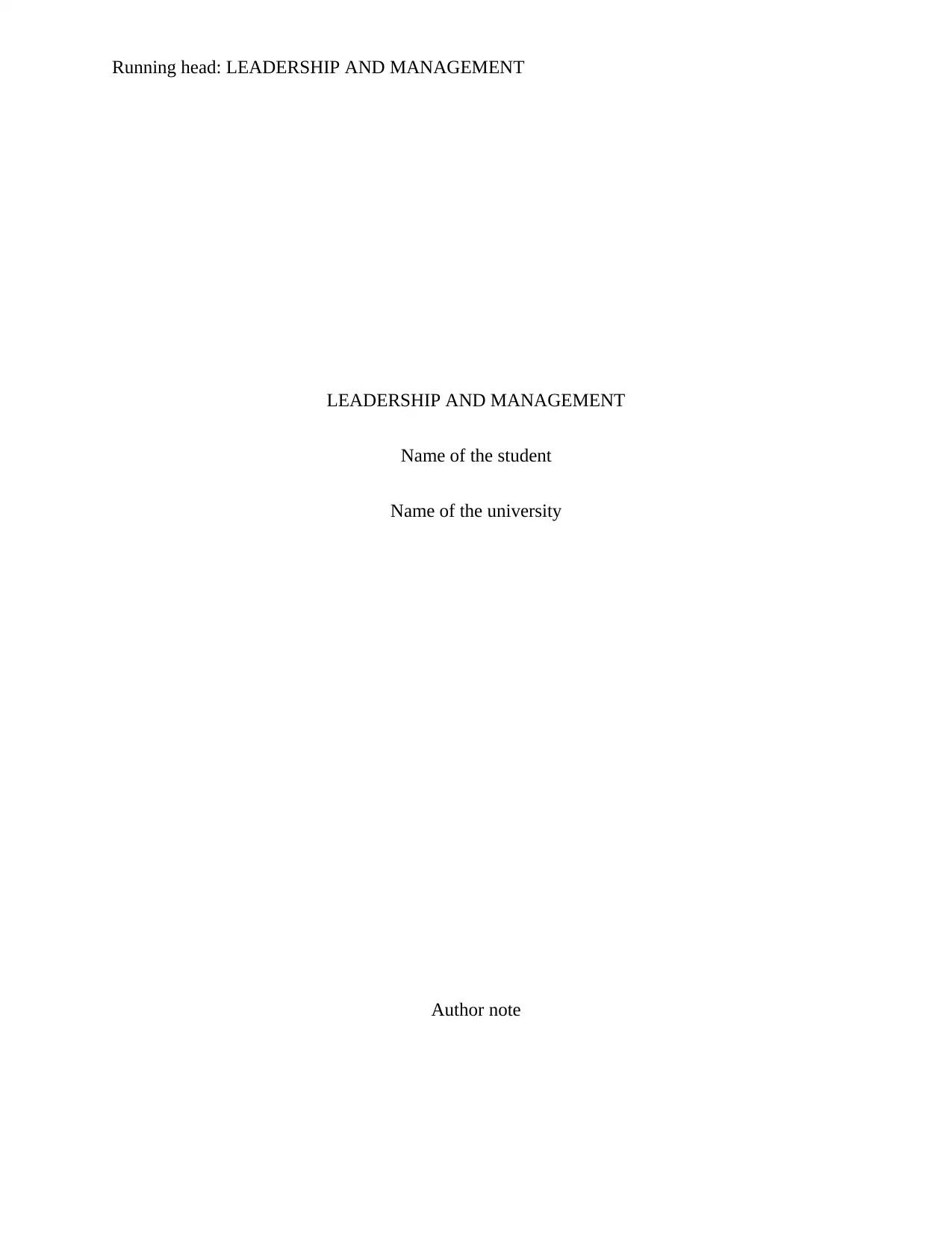
Running head: LEADERSHIP AND MANAGEMENT
LEADERSHIP AND MANAGEMENT
Name of the student
Name of the university
Author note
LEADERSHIP AND MANAGEMENT
Name of the student
Name of the university
Author note
Paraphrase This Document
Need a fresh take? Get an instant paraphrase of this document with our AI Paraphraser
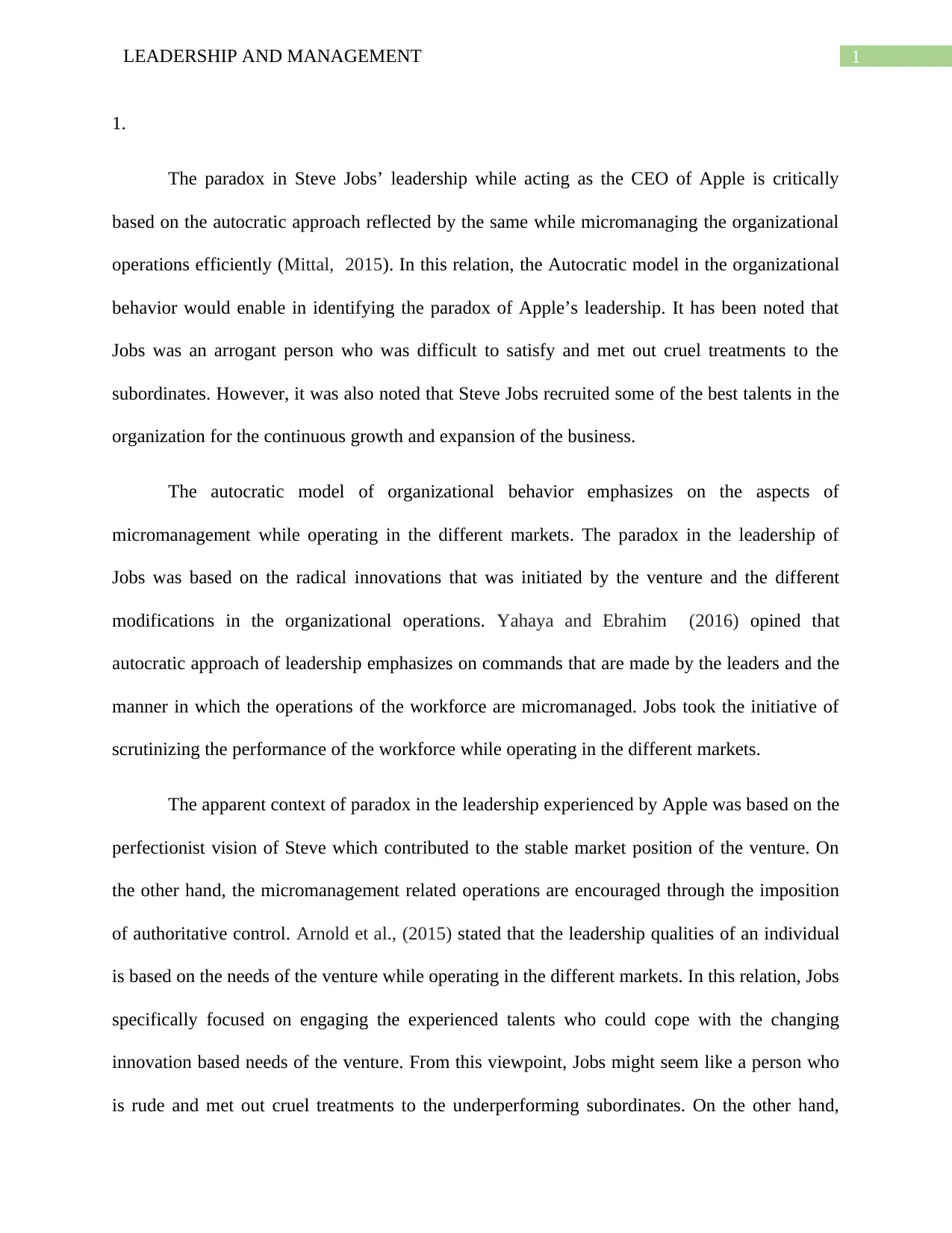
1LEADERSHIP AND MANAGEMENT
1.
The paradox in Steve Jobs’ leadership while acting as the CEO of Apple is critically
based on the autocratic approach reflected by the same while micromanaging the organizational
operations efficiently (Mittal, 2015). In this relation, the Autocratic model in the organizational
behavior would enable in identifying the paradox of Apple’s leadership. It has been noted that
Jobs was an arrogant person who was difficult to satisfy and met out cruel treatments to the
subordinates. However, it was also noted that Steve Jobs recruited some of the best talents in the
organization for the continuous growth and expansion of the business.
The autocratic model of organizational behavior emphasizes on the aspects of
micromanagement while operating in the different markets. The paradox in the leadership of
Jobs was based on the radical innovations that was initiated by the venture and the different
modifications in the organizational operations. Yahaya and Ebrahim (2016) opined that
autocratic approach of leadership emphasizes on commands that are made by the leaders and the
manner in which the operations of the workforce are micromanaged. Jobs took the initiative of
scrutinizing the performance of the workforce while operating in the different markets.
The apparent context of paradox in the leadership experienced by Apple was based on the
perfectionist vision of Steve which contributed to the stable market position of the venture. On
the other hand, the micromanagement related operations are encouraged through the imposition
of authoritative control. Arnold et al., (2015) stated that the leadership qualities of an individual
is based on the needs of the venture while operating in the different markets. In this relation, Jobs
specifically focused on engaging the experienced talents who could cope with the changing
innovation based needs of the venture. From this viewpoint, Jobs might seem like a person who
is rude and met out cruel treatments to the underperforming subordinates. On the other hand,
1.
The paradox in Steve Jobs’ leadership while acting as the CEO of Apple is critically
based on the autocratic approach reflected by the same while micromanaging the organizational
operations efficiently (Mittal, 2015). In this relation, the Autocratic model in the organizational
behavior would enable in identifying the paradox of Apple’s leadership. It has been noted that
Jobs was an arrogant person who was difficult to satisfy and met out cruel treatments to the
subordinates. However, it was also noted that Steve Jobs recruited some of the best talents in the
organization for the continuous growth and expansion of the business.
The autocratic model of organizational behavior emphasizes on the aspects of
micromanagement while operating in the different markets. The paradox in the leadership of
Jobs was based on the radical innovations that was initiated by the venture and the different
modifications in the organizational operations. Yahaya and Ebrahim (2016) opined that
autocratic approach of leadership emphasizes on commands that are made by the leaders and the
manner in which the operations of the workforce are micromanaged. Jobs took the initiative of
scrutinizing the performance of the workforce while operating in the different markets.
The apparent context of paradox in the leadership experienced by Apple was based on the
perfectionist vision of Steve which contributed to the stable market position of the venture. On
the other hand, the micromanagement related operations are encouraged through the imposition
of authoritative control. Arnold et al., (2015) stated that the leadership qualities of an individual
is based on the needs of the venture while operating in the different markets. In this relation, Jobs
specifically focused on engaging the experienced talents who could cope with the changing
innovation based needs of the venture. From this viewpoint, Jobs might seem like a person who
is rude and met out cruel treatments to the underperforming subordinates. On the other hand,
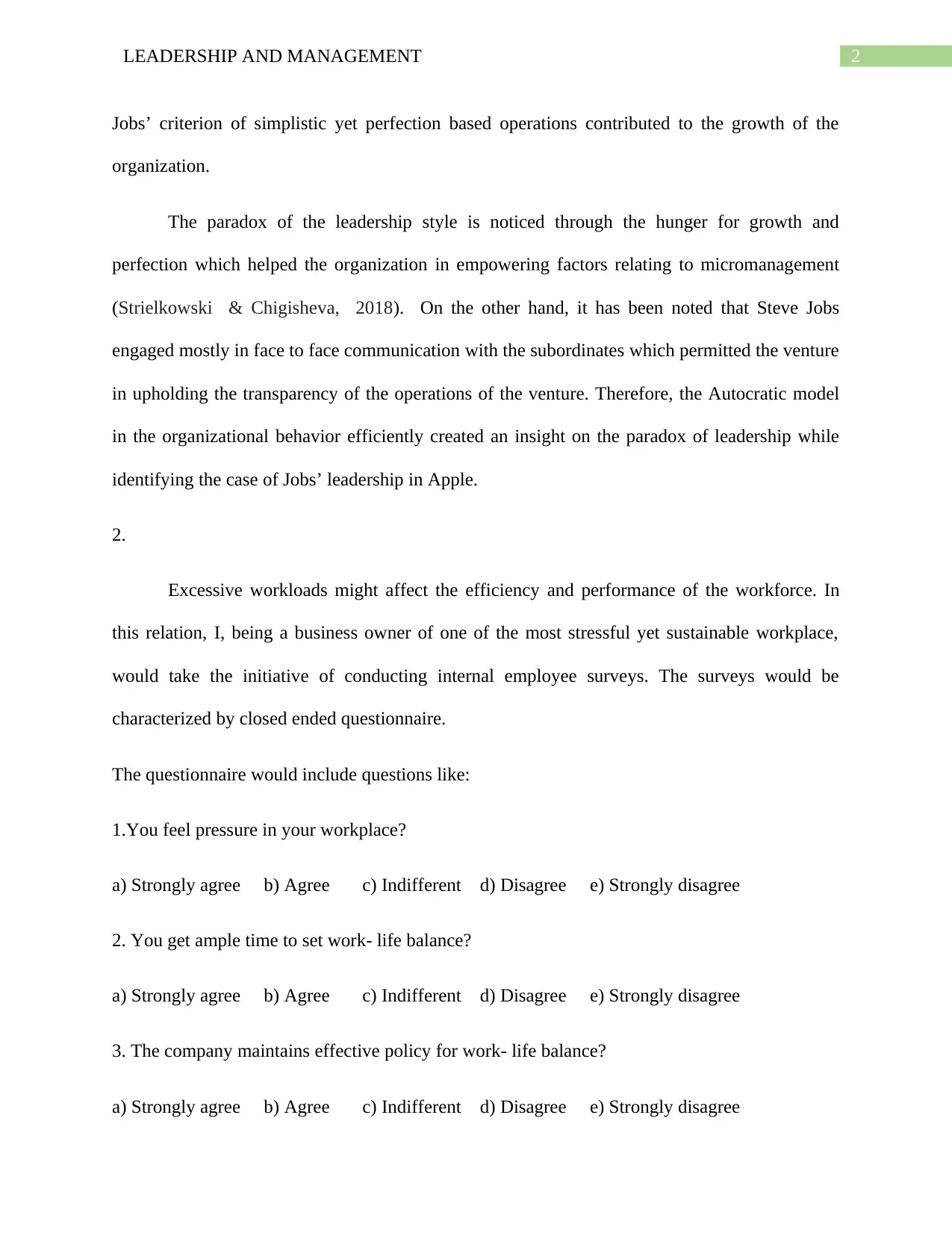
2LEADERSHIP AND MANAGEMENT
Jobs’ criterion of simplistic yet perfection based operations contributed to the growth of the
organization.
The paradox of the leadership style is noticed through the hunger for growth and
perfection which helped the organization in empowering factors relating to micromanagement
(Strielkowski & Chigisheva, 2018). On the other hand, it has been noted that Steve Jobs
engaged mostly in face to face communication with the subordinates which permitted the venture
in upholding the transparency of the operations of the venture. Therefore, the Autocratic model
in the organizational behavior efficiently created an insight on the paradox of leadership while
identifying the case of Jobs’ leadership in Apple.
2.
Excessive workloads might affect the efficiency and performance of the workforce. In
this relation, I, being a business owner of one of the most stressful yet sustainable workplace,
would take the initiative of conducting internal employee surveys. The surveys would be
characterized by closed ended questionnaire.
The questionnaire would include questions like:
1.You feel pressure in your workplace?
a) Strongly agree b) Agree c) Indifferent d) Disagree e) Strongly disagree
2. You get ample time to set work- life balance?
a) Strongly agree b) Agree c) Indifferent d) Disagree e) Strongly disagree
3. The company maintains effective policy for work- life balance?
a) Strongly agree b) Agree c) Indifferent d) Disagree e) Strongly disagree
Jobs’ criterion of simplistic yet perfection based operations contributed to the growth of the
organization.
The paradox of the leadership style is noticed through the hunger for growth and
perfection which helped the organization in empowering factors relating to micromanagement
(Strielkowski & Chigisheva, 2018). On the other hand, it has been noted that Steve Jobs
engaged mostly in face to face communication with the subordinates which permitted the venture
in upholding the transparency of the operations of the venture. Therefore, the Autocratic model
in the organizational behavior efficiently created an insight on the paradox of leadership while
identifying the case of Jobs’ leadership in Apple.
2.
Excessive workloads might affect the efficiency and performance of the workforce. In
this relation, I, being a business owner of one of the most stressful yet sustainable workplace,
would take the initiative of conducting internal employee surveys. The surveys would be
characterized by closed ended questionnaire.
The questionnaire would include questions like:
1.You feel pressure in your workplace?
a) Strongly agree b) Agree c) Indifferent d) Disagree e) Strongly disagree
2. You get ample time to set work- life balance?
a) Strongly agree b) Agree c) Indifferent d) Disagree e) Strongly disagree
3. The company maintains effective policy for work- life balance?
a) Strongly agree b) Agree c) Indifferent d) Disagree e) Strongly disagree
⊘ This is a preview!⊘
Do you want full access?
Subscribe today to unlock all pages.

Trusted by 1+ million students worldwide
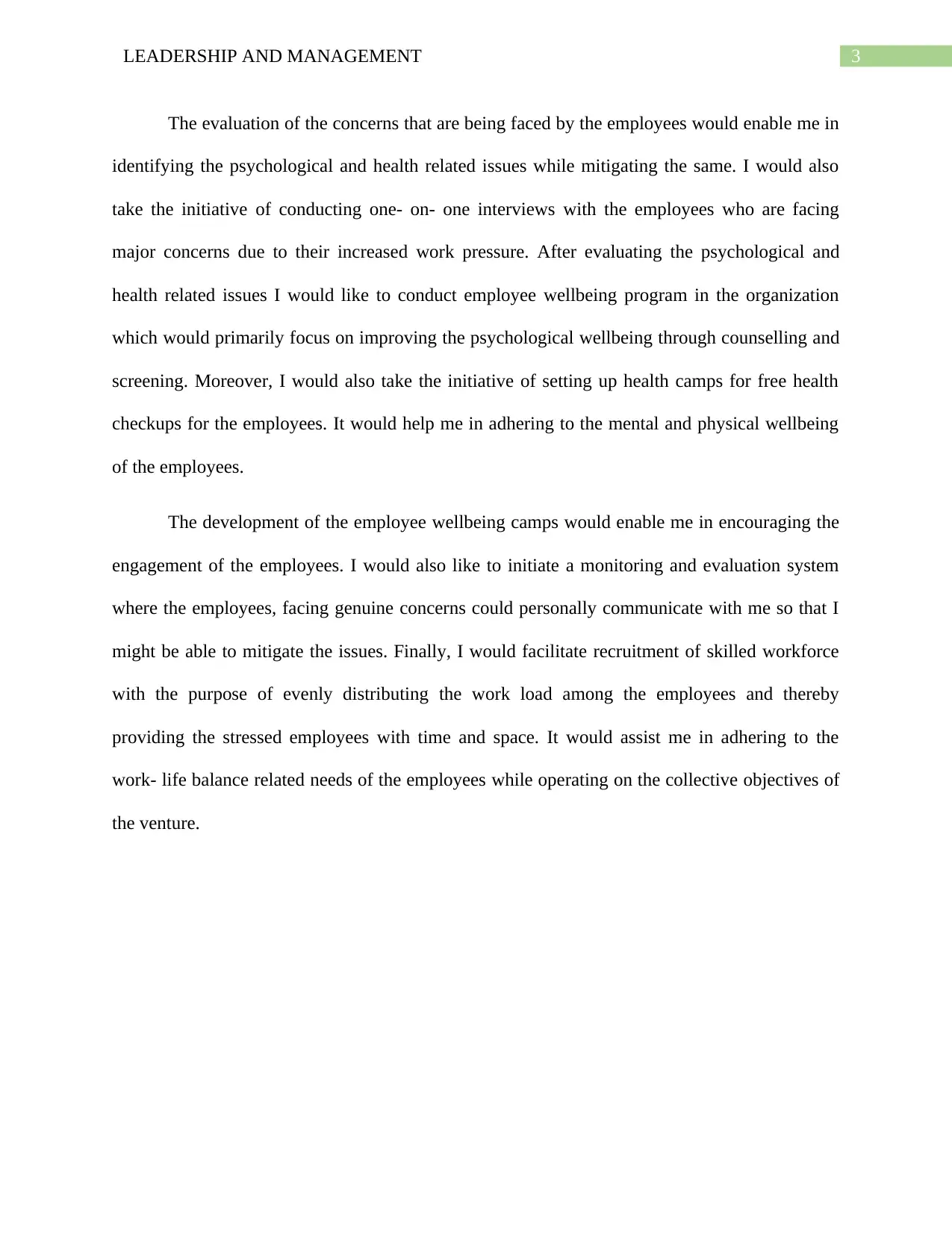
3LEADERSHIP AND MANAGEMENT
The evaluation of the concerns that are being faced by the employees would enable me in
identifying the psychological and health related issues while mitigating the same. I would also
take the initiative of conducting one- on- one interviews with the employees who are facing
major concerns due to their increased work pressure. After evaluating the psychological and
health related issues I would like to conduct employee wellbeing program in the organization
which would primarily focus on improving the psychological wellbeing through counselling and
screening. Moreover, I would also take the initiative of setting up health camps for free health
checkups for the employees. It would help me in adhering to the mental and physical wellbeing
of the employees.
The development of the employee wellbeing camps would enable me in encouraging the
engagement of the employees. I would also like to initiate a monitoring and evaluation system
where the employees, facing genuine concerns could personally communicate with me so that I
might be able to mitigate the issues. Finally, I would facilitate recruitment of skilled workforce
with the purpose of evenly distributing the work load among the employees and thereby
providing the stressed employees with time and space. It would assist me in adhering to the
work- life balance related needs of the employees while operating on the collective objectives of
the venture.
The evaluation of the concerns that are being faced by the employees would enable me in
identifying the psychological and health related issues while mitigating the same. I would also
take the initiative of conducting one- on- one interviews with the employees who are facing
major concerns due to their increased work pressure. After evaluating the psychological and
health related issues I would like to conduct employee wellbeing program in the organization
which would primarily focus on improving the psychological wellbeing through counselling and
screening. Moreover, I would also take the initiative of setting up health camps for free health
checkups for the employees. It would help me in adhering to the mental and physical wellbeing
of the employees.
The development of the employee wellbeing camps would enable me in encouraging the
engagement of the employees. I would also like to initiate a monitoring and evaluation system
where the employees, facing genuine concerns could personally communicate with me so that I
might be able to mitigate the issues. Finally, I would facilitate recruitment of skilled workforce
with the purpose of evenly distributing the work load among the employees and thereby
providing the stressed employees with time and space. It would assist me in adhering to the
work- life balance related needs of the employees while operating on the collective objectives of
the venture.
Paraphrase This Document
Need a fresh take? Get an instant paraphrase of this document with our AI Paraphraser
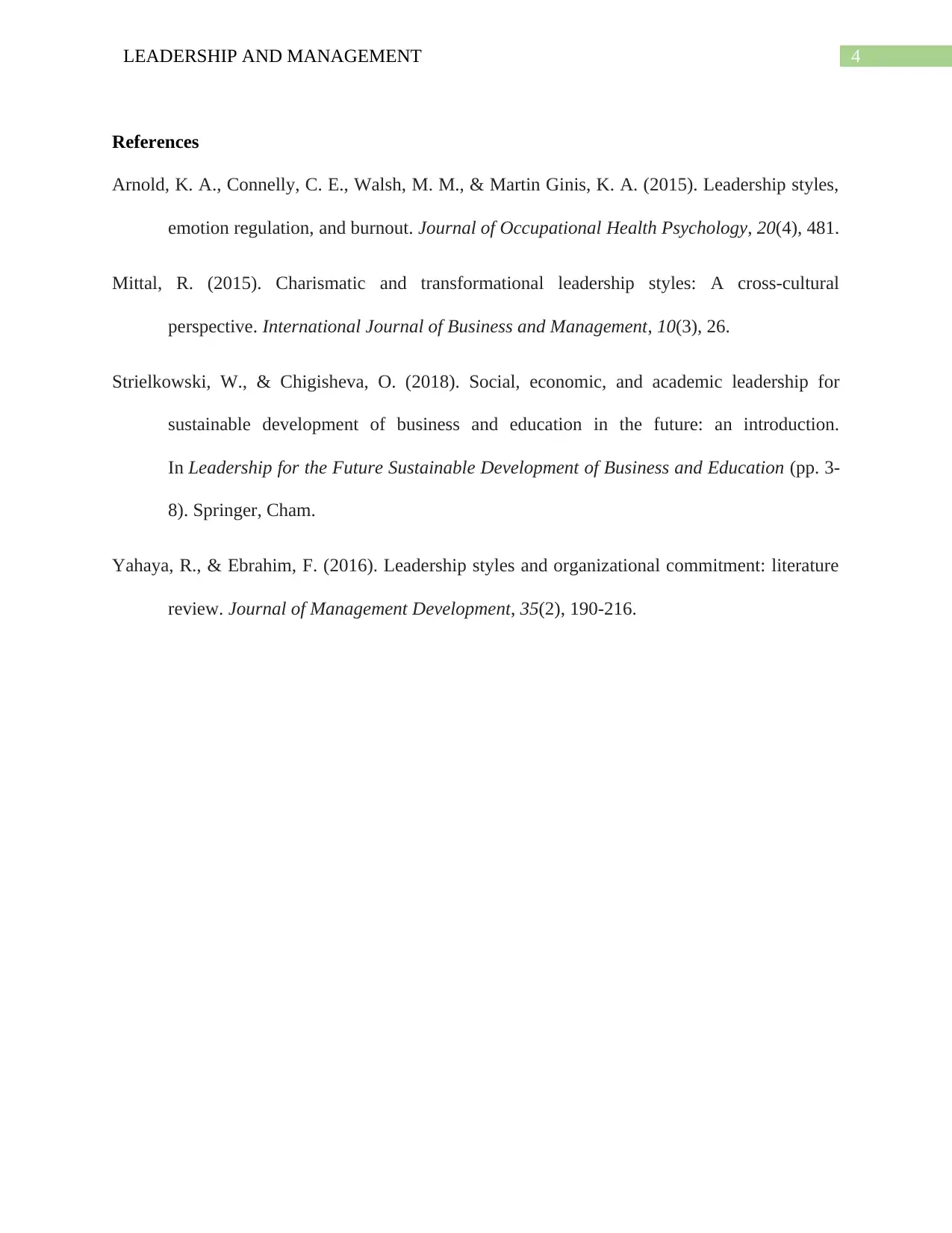
4LEADERSHIP AND MANAGEMENT
References
Arnold, K. A., Connelly, C. E., Walsh, M. M., & Martin Ginis, K. A. (2015). Leadership styles,
emotion regulation, and burnout. Journal of Occupational Health Psychology, 20(4), 481.
Mittal, R. (2015). Charismatic and transformational leadership styles: A cross-cultural
perspective. International Journal of Business and Management, 10(3), 26.
Strielkowski, W., & Chigisheva, O. (2018). Social, economic, and academic leadership for
sustainable development of business and education in the future: an introduction.
In Leadership for the Future Sustainable Development of Business and Education (pp. 3-
8). Springer, Cham.
Yahaya, R., & Ebrahim, F. (2016). Leadership styles and organizational commitment: literature
review. Journal of Management Development, 35(2), 190-216.
References
Arnold, K. A., Connelly, C. E., Walsh, M. M., & Martin Ginis, K. A. (2015). Leadership styles,
emotion regulation, and burnout. Journal of Occupational Health Psychology, 20(4), 481.
Mittal, R. (2015). Charismatic and transformational leadership styles: A cross-cultural
perspective. International Journal of Business and Management, 10(3), 26.
Strielkowski, W., & Chigisheva, O. (2018). Social, economic, and academic leadership for
sustainable development of business and education in the future: an introduction.
In Leadership for the Future Sustainable Development of Business and Education (pp. 3-
8). Springer, Cham.
Yahaya, R., & Ebrahim, F. (2016). Leadership styles and organizational commitment: literature
review. Journal of Management Development, 35(2), 190-216.
1 out of 5
Related Documents
Your All-in-One AI-Powered Toolkit for Academic Success.
+13062052269
info@desklib.com
Available 24*7 on WhatsApp / Email
![[object Object]](/_next/static/media/star-bottom.7253800d.svg)
Unlock your academic potential
Copyright © 2020–2026 A2Z Services. All Rights Reserved. Developed and managed by ZUCOL.





